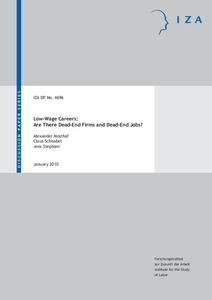Low-wage careers: are there dead-end firms and dead-end jobs?
"Using representative linked employer-employee data of the German Federal Employment Agency, this paper shows that just one out of seven full-time employees who earned low wages (i.e. less than two-thirds of the median wage) in 1998/99 was able to earn wages above the low-wage threshold in 2003...
| Main Authors: | , , |
|---|---|
| Institution: | ETUI-European Trade Union Institute |
| Format: | TEXT |
| Language: | English |
| Published: |
Bonn
2010
IZA |
| Subjects: | |
| Online Access: | https://www.labourline.org/KENTIKA-19186560124919047429-Low-wage-careers-are-there-dea.htm |
| Summary: | "Using representative linked employer-employee data of the German Federal Employment Agency, this paper shows that just one out of seven full-time employees who earned low wages (i.e. less than two-thirds of the median wage) in 1998/99 was able to earn wages above the low-wage threshold in 2003. Bivariate probit estimations with endogenous selection indicate that upward wage mobility is higher for younger and better qualified low-wage earners, whereas women are substantially less successful. We show that the characteristics of the employing firm also matter for low-wage earners' probability of escaping low-paid work. In particular small plants and plants with a high share of low-wage earners often seem to be dead ends for low-wage earners. The likelihood of leaving the low-wage sector is also low when staying in unskilled and skilled service occupations and in unskilled commercial and administrational occupations. Consequently, leaving these dead-end plants and occupations appears to be an important instrument for achieving wages above the low-wage threshold. " |
|---|---|
| Physical Description: | 26 p. Digital |

